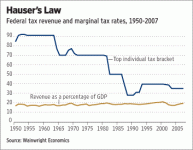Wow, where do I start.
How about letting the Bush tax cuts expire, which will increase taxes, which will happen if congress does nothing, so higher taxes are coming.
Bush and congress over spent, but tax cuts help increase tax revenue, just goggle the Laffer curve and learn.
I think the analogy now is we have the car on the track going wide open the wrong direction and it time to change the whole team. So if they the current party gets everything they want we won't be able to unring the bell, so I hope they fail enacting their policies
The democracy will cease to exist when you take away from those who are willing to work and give to those who would not.
Well I "goggled" the Laffer Curve and guess what it's a laugher;
Posted on Tuesday, May 2, 2006, 12:00AM
In this column, I'm focusing on bad economics. In fact, I'm going to write about what I consider to be the two worst economic ideas -- or at least ideas that pass as economics, though both have been thoroughly repudiated by nearly all credible thinkers.
When I say worst, I don't mean the most outlandish (e.g. stock prices are controlled by aliens) because those ideas usually collapse of their own weight. Rather, the most pernicious bad ideas in economics are those that have a ring of truth. They're hard to debunk because they have a certain intuitive appeal. As a result, they stick around, providing bogus intellectual cover for bad policy, year after year, decade after decade.
For the sake of political balance, I'll skewer a favorite of the right in this column, and then a favorite of the left in my next piece.
The Laffer Curve
Economist Arthur Laffer made a very interesting supposition: If tax rates are high enough, then cutting taxes might actually generate more revenue for the government, or at least pay for themselves. (In one of life's great coincidences, he first sketched a graph of this idea on Dick Cheney's cocktail napkin.) If the government cuts taxes, then Uncle Sam gets a smaller cut of all economic activity -- but reducing taxes also generates new economic activity. Laffer reasoned that, under some circumstances, a tax cut would stimulate so much new economic activity that the government would end up with more in its coffers -- by taking a smaller slice of a much larger pie.
In fairness to Mr. Laffer, there's nothing wrong with this theory. It's almost certainly true at very high rates of taxation. If you consider the extreme, say a 99 percent marginal tax rate, then the government will probably not be collecting a lot of revenue. To begin with, citizens are going to hide as much income as possible. (The more honest ones will turn to barter and avoid the tax system entirely.) And no one is going to rush out and take a second job or build a factory if they get to keep only $1 of every $100 that they earn.
So it's entirely plausible that slashing tax rates from 99 percent to 30 percent could increase government tax revenues. It would deflate the black market and provide a huge new incentive to work and invest.
No Big Jolt for the U.S.
But here's the problem when we take Laffer's theory and try to apply it in the U.S.: We don't have a 99 percent marginal tax rate. Or 70 percent. Or even 50 percent. We start with low marginal tax rates relative to the rest of the developed world. (Yes, I understand that it may not feel that way after the check you wrote last month.)
So cutting the tax rate from 36 percent to 33 percent is not going to give you the same kind of economic jolt as slashing a tax rate from 90 percent to 50 percent. There's no huge black market to be shut down, no big supply of skilled workers to be lured back into the labor market, and so on.
Will it generate new economic activity? Probably. And that will generate some incremental tax revenue for the government. But remember, it also means that the government will be taking a smaller cut of all the economic activity that we already have.
Think about a simple numerical example: Assume you've got a $10 trillion economy and an average tax rate of 30 percent. So the government takes $3 trillion.
Let's cut the average tax rate to 25 percent and, for the sake of example, assume that it generates $1 trillion in new economic growth (a Herculean assumption, by the way). So now, what does Uncle Sam get? One quarter of $11 trillion is only $2.75 trillion. The economy grows, government revenues shrink.
That's basically what happened with the large Reagan and George W. Bush tax cuts, both of which were followed by large budget deficits. Yes, spending has a lot to do with that, but the bottom line is unequivocal: In both cases, government revenue was lower than it would have been without the tax cuts.
Can't Lose Weight by Eating More
Neither the Reagan nor the George W. Bush tax cuts were "self-financing," as the Laffer disciples like to argue. According to The Economist -- my former employer and no bastion of left-wing thought -- the current Bush Administration's top economist, Gregory Mankiw, estimated that decreasing taxes on labor would generate enough growth to recoup only about 17 cents for each lost dollar; a tax cut on capital is better, paying for more than half of itself. Still, the bottom line from the Bush Administration itself is that tax cuts reduce Uncle Sam's take.
So why does Laffer's sketch on Dick Cheney's cocktail napkin rank near the top of my list of bad economic ideas? Because, when applied to the U.S., it's intellectually dishonest. The Laffer Curve offers the false promise that we can cut taxes without making any sacrifice on the spending side, and that's simply not true. It's the economic equivalent of arguing that you can lose weight by eating more.
Let me be perfectly clear: I'm not arguing that tax cuts are bad. I'm simply pointing out that we can't pretend that tax cuts won't require reductions on the spending side to balance the budget. In fact, you can disregard every other argument in this column and think about one thing: If Laffer were right, lower taxes would never require any spending sacrifice. We could pay a mere one percent of our income in taxes and still fund all of our government spending -- and maybe more! Do you think that's really possible?
This column should give you a hint of why economics is called the dismal science -- it's all about tradeoffs. We're the ones telling you that if you get more of something, you probably have to get less of something else.
Whether it's tax policy or dieting, you can't have your cake and lose weight, too, which is why America currently has huge deficits and a lot of fat people.
http://finance.yahoo.com/expert/article/economist/4065?p=1
Be careful what you wish for...

